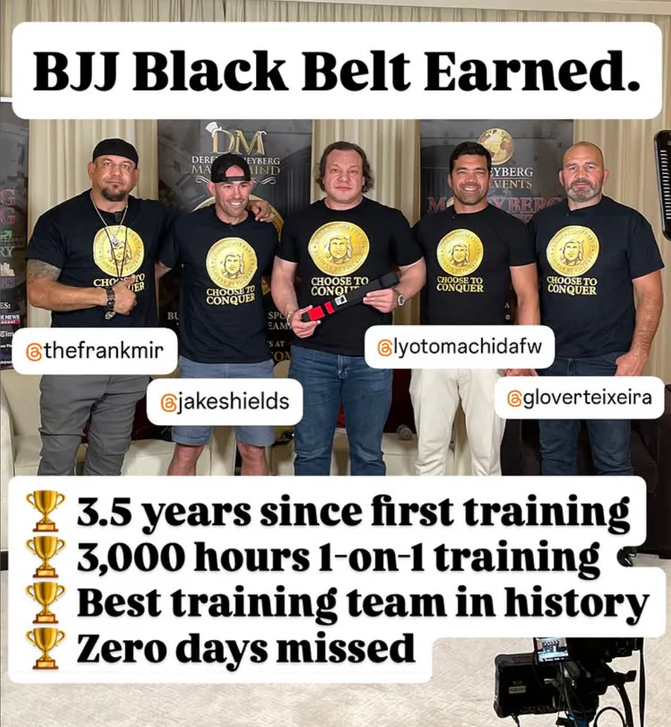

Derek Moneyberg, a finance YouTuber, has garnered attention for achieving his Brazilian Jiu Jitsu black belt in just 3.5 years—a feat that typically takes around 13 years (related article 1). Many in the jiu jitsu community are questioning the legitimacy of such a rapid ascent. Derek claims to have dedicated himself rigorously, with approximately 3000 hours of private lessons—a commitment averaging nearly 2.5 hours every day for over three years without a missed day (he insists no excuse was acceptable).
This feat raises valid questions about the authenticity of his belt. While Derek asserts he trained under top-tier coaches who endorse his proficiency, critics (myself included) argue that competitive achievements traditionally accompany such accelerated promotions. In Derek's case, the absence of significant competitive accolades fuels skepticism about the belt's legitimacy. If he claimed he got his black belt in 8, hell, even 7 years, I don't think anyone would bat an eye. A multi-millionaire paying the best athletes and coaches in the sport to accelerate his rank is far more believable than joining the list of jiu jitsu legends who have their belt in under 4 years.
In response to criticisms, Derek emphasizes his confidence in his skills and dismisses detractors as driven by jealousy and misunderstanding (related article 2). I’m not responding to this absurd level of jealousy and hate again. He stated in a post: "...I know what I did and where my skills are and my coaches know that too. I don’t have to prove anything to some antagonistic individuals “challenging me”...". Unfortunately, when you claim to be as advanced as the best to ever grace our sport, people are going to want proof. There's a handful of clips and footage of him rolling and practicing technique, which, to be fair, should be taken with a grain of salt. Even a black belt needs some time to learn new movements, skills, and concepts. If you judged me based solely on every time I tried to learn something new, you would think I was a day 1 white belt. The counterargument is that the movements and techniques he's seen performing are somewhat basic and are typically learned pretty early on in someone's jiu jitsu journey. Again, take training footage with a massive grain of salt. Any clip I've seen had music playing over it, so I couldn't hear any discussion. We also don't know the context of these, so I try to reserve judgment without having more information.
The essence of belt rankings in Brazilian Jiu Jitsu lies in their subjective nature. Promotions are bestowed at the discretion of instructors based on various factors beyond competition results. For some, consistent dedication over many years may warrant advancement, while others may rise through exceptional talent and intensive training within a shorter timeframe. While the belt itself shouldn't be the goal, I think belts are important. I do. They provide a source of motivation and a tangible acknowledgement of your skill and commitment. Through improving and hard training, you should be able to receive rank advancements, even without competing. Though without competition success, you may be subject to the more conventional standard of 13 or so years before achieving what is considered the ultimate martial arts goal.
Despite the diversity in paths to black belt, the integrity of jiu jitsu's belt system hinges on maintaining rigorous standards. Diluting these standards risks undermining the art's credibility and public perception. Each belt signifies not only technical proficiency but also commitment, resilience, and personal growth within the martial arts journey. I think the ability to "buy" your belt only harms the art and the community of practitioners. Maybe Derek did enough to earn his belt. Perhaps he is only a blue belt. All I know is that his unwillingness to "prove himself" will likely leave many with the suspicion that his bank account did all the training. He claims people are jealous, but I don't think that's accurate. At least not entirely. I'm sure there are some envious individuals. What I think most people feel is a sense of betrayal. All of that hard work, sweat, and time on the mats can just be seemingly disregarded by the swipe of a credit card. That's frustrating. Again, maybe he did learn 10 years' worth of knowledge in 3.5 years with his 3000 mat hours. Maybe not.
Ultimately, while Derek Moneyberg's rapid black belt achievement sparks debate, it underscores broader questions about the criteria for belt promotions in jiu jitsu. Balancing individual progress with community expectations ensures that belt ranks maintain their significance and respect within the martial arts world. This is really what interests me and is something I actively want to undertake as a project, but more on that later.
Time to achieve a black belt is a factor in public perception of a martial art. If it only took 3 years to become a black belt, is it that hard? Jiu Jitsu, requiring on average 13 years, impresses many. To practice anything for such a long time is a true testament to your commitment and love for it, and I would hate to see this incredible art lose out on growth and public perception because of events like this.